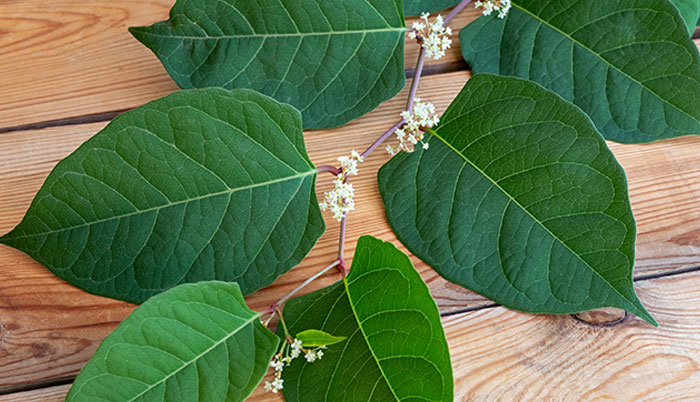![]() Home > Health
Home > Health
STUDY: Japanese Knotweed Extract (Resveratrol) May Help Reduce Cancer Risk Linked To Processed Meat (Sodium Nitrite)

![]() September 24th, 2021 | 17:12 PM |
September 24th, 2021 | 17:12 PM | ![]() 492 views
492 views
NATURALNEWS
Many gardeners are wary of Japanese knotweed (Fallopia japonica), especially since it’s invasive to the United States. But in a paper published in the journal Molecular Nutrition and Food Research, researchers have found that Japanese knotweed extract can help reduce the harmful effects of nitrite in processed foods like bacon.
Resveratrol and Japanese knotweed
Despite being infamous among homeowners, researchers have discovered that Japanese knotweed could replace the harmful nitrite preservative used to make cured meats like bacon and sausages. Many studies have shown that diets high in nitrite are linked to a higher risk of colorectal cancers. Because of this risk, researchers from the University of Reading have started studying knotweed as a potential alternative to nitrite.
Under the PHYTOME (phytochemicals to reduce nitrite in meat products) project, researchers have developed processed red meat made with natural substitutes that help reduce the carcinogenic compound nitrite added to preserve meats. Unlike commercially processed foods with nitrite, PHYTOME’s range of hams and sausages contained different plants and fruits.
The natural substitutes included known superfoods like green tea, rosemary, and resveratrol, which is an extract taken from Japanese knotweed.
For the project, experts developed versions of cooked and dry-cured red meats which replaced nitrite with these plant-based natural alternatives. Scientists also tested if the substitutes would have a similar effect on meat products with normal nitrite levels.
Natural additives and reduced cancer risk
The paper detailed how an international team of scientists tested the specially formulated products on conventionally processed red meat, along with white meat.
Findings revealed that signs of nitrite content in the volunteers’ feces were much lower when they consumed both specially formulated meats. They added that levels were similar to those who consumed the minimally processed white meat.
Gunter Kuhnle, Professor of Nutrition and Food Science at the University of Reading, explained that the PHYTOME project aims to address “ongoing worries about highly processed red meat,” which often focused on nitrite and its links to cancer.
According to the project’s findings, using natural additives to make processed red meat helped reduce the creation of compounds in the body often associated with cancer, added Kuhnle.
He also said that natural additives like Japanese knotweed seemed to have some protective effects, even when they were used to make red meat that still contained nitrite. The researchers hope that natural additives could be used to reduce some of the potentially harmful effects of nitrite, even in foods where nitrite preservatives are a necessary ingredient.
The scientists also looked into how the nitrate content in drinking water can affect the formation of nitrite, a compound produced in the body.
The research team controlled for this by controlling water consumption during the trial. Volunteers were also tested with both low and high nitrate-containing water during separate testing periods.
After controlling for drinking water, findings revealed that the PHYTOME-developed red meats produced lower levels of nitrite production in the body compared to either conventional red meat or unprocessed white meat.
What is Japanese knotweed?
Japanese knotweed is an herbaceous perennial member of the buckwheat family. The plant was introduced to America from East Asia in the late 1800s as an ornamental. The plant was also used to naturally stabilize streambanks. As an invasive species, Japanese knotweed can quickly spread in drainage ditches, forest edges, stream corridors and wetlands across the country.
As confirmed in the paper, Japanese knotweed is full of resveratrol, a powerful antioxidant also found in lesser quantities in other superfoods like grapes, mulberries and red wine. The plant is also rich in nutrients like manganese, phosphorus, potassium, vitamins A and C and zinc.
Because of its antioxidant properties, Japanese knotweed can help reduce inflammation. The plant is also used to treat inflammatory conditions like arthritis, gout, joint disease and various skin diseases.
Japanese knotweed is also said to be good for digestive problems, eye health, and liver disease. In Japan, knotweed is used as a mild laxative.
How to incorporate Japanese knotweed into your regular diet
When harvesting knotweed, note that the best time to eat it is when the shoots are young in the spring.
You can use Japanese knotweed as a substitute for rhubarb when making cakes, crisps, jellies, pies, or syrups. Knotweed shoots and young leaves can be steamed and eaten plain like asparagus or used in chutneys, quiches, risottos, sauces, soups, or stews.
To make a Japanese knotweed puree, boil the stems with water and sugar or sugar substitute until the pieces are soft. Add lemon juice and more sweetener to taste.
This homemade puree can be eaten as a dessert or used as pie filling. Knotweed puree can also be used for breads, cakes, or muffins. Alternatively, the puree can be added to a breakfast smoothie or fruit juice.
Japanese knotweed is considered generally safe to eat. However, the superfood is high in oxalic acid so avoid it if you are allergic to rhubarb or spinach. You should also consult a physician before consuming Japanese knotweed if you are pregnant, breastfeeding, have a chronic medical condition, or take medications.
Source:
courtesy of NATURALNEWS
by Zoey Sky
If you have any stories or news that you would like to share with the global online community, please feel free to share it with us by contacting us directly at [email protected]